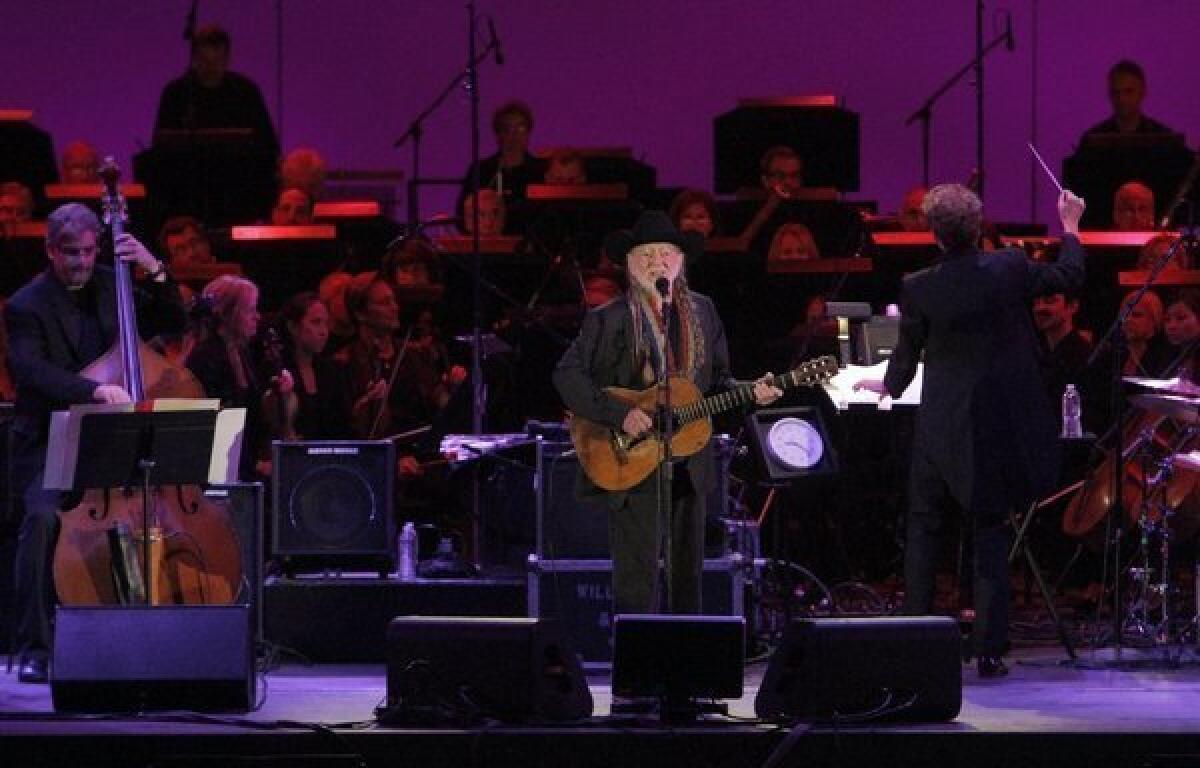Review: Willie Nelson performs ‘Stardust’ at the Hollywood Bowl

- Share via
This post has been corrected. See below for details.
Though unassuming, the kitchen clock onstage near Willie Nelson’s amplifier at the Hollywood Bowl was the perfect prop. The Texas singer on Friday night delivered the entirety of his 1978 album of classic ballads, “Stardust,” and the second hand circled, chronicling the moments while elegantly crafted lines and melodies, as pure as a perfect haiku, drifted into the crowd.
“Funny how time slips away,” he observed in his self-penned classic of the same name. As the 80-year-country music icon offered his wavering croon for “September Song,” the lines “... but the days grow short when you reach September” resonated. Wearing a black cowboy hat, his braids dangling down his chest and holding a guitar so weathered and grungy that he might also be using it as a bong, Nelson strummed and plucked while grand orchestrations lifted the songs. (Nelson will perform on Saturday at the Bowl, as well.)
With the backing of the Hollywood Bowl Orchestra under the direction of David Campbell, Nelson and his band moved from ballad to ballad, the composer of some of the great songs of the past half-century playing renditions of work that inspired him.
TIMELINE: Must see summer shows
Writer Ariel Swartley aptly described the works on “Stardust” in her original Rolling Stone review as “the folk music of exurban America,” and if the arrangements at times were as melodramatic and treacly as a Disney score, Nelson elegantly paid his melancholy album the utmost respect.
One by one they arrived, ballads sparse with lines but rich with meaning. Songs like Hoagy Carmichael and Mitchell Parish’s “Stardust” were about memories. Others, like Irving Berlin’s blissful “Blue Skies,” observed the fluidity of time, “noticing the days hurrying by -- when you’re in love, how they fly.” On an evening highlight, Nelson sang in “Unchained Melody” of a love that changes everything, but seems dangling by a thread. “Time goes by so slowly, and time can do so much,” he sang, before asking in spare voice, “Are you still mine?”
“Stardust” was released when Nelson was 45 years old, and had been writing country hits for two decades. By his mid-20s he’d already penned “Crazy” (which Patsy Cline made into a standard), “Funny How Time Slips Away” and “Hello Walls.” He’d retired at 40, only to pull a Jay-Z and return soon thereafter to help propel the “outlaw country” movement of musicians like Kris Kristoffersen, Waylon Jennings and David Allan Coe bring dirt and grime back into the genre.
Then, with punk rock upending rock and disco and funk ruling the R&B; charts, Nelson pulled his own rebel move: Releasing “Stardust,” the softest, gentlest album he’d ever made. Despite protestations from his label, which wanted him to pen more records including “On the Road Again,” “Stardust” landed at No. 1 on the country album chart, and remained on it for 10 years.
Though backed by a full orchestra, Nelson’s acoustic guitar was deservedly prominent, and over the course of “Stardust” and an additional half-dozen of his best, he offered solos and punctual runs that fluttered while strings, brass and woodwinds spun through the melodies.
For “Crazy,” Nelson sang a song he’s been performing live for half a century while Campbell delivered a variation on producer Owen Bradley’s Cline arrangement. A song so perfect that it seems to exist beyond one man’s hand, Nelson played it simply and with the patient phrasing of someone who knows every syllable and every guitar line -- even if his once-nimble fingers betrayed him during quicker runs on some songs.
“Worry -- why do I let myself worry,” he sang as much of the Bowl whispered quietly along, the voice of a narrator at war with his heart.
Opening the show was fellow Texan Lyle Lovett and His Large Band, whose cosmopolitan country music delivered a more wry, literary version of the genre Nelson helped transform. Playing songs from throughout his own accomplished career, Lovett was as charming and engaging as ever, his chiseled, deadpan face singing in sexy voice of love, heartbreak and joy. At his best, as on the story of a road trip from Texas to Southern California, “L.A. County,” Lovett offered vivid lines about love turned deadly as a spurned lover takes revenge.
Unlike Lovett’s protagonist, Nelson’s got little use for vengeance at this point. Rather, on a bittersweet night in which an aged master looked back to a key moment in his artistic life, context teamed up with beauty to offer work both poignant and life-affirming.
[For the record, Aug. 10: The original version of this post wrongly identified Townes Van Zandt’s song “Poncho and Lefty” as being written by Willie Nelson. We have corrected the post.]
ALSO:
Willie Nelson to show classic side at the Hollywood Bowl
Hear now: Stevie Wonder and Ozomatli do ‘Land of La La’ live
Review: Steve Martin & Steep Canyon Rangers at the Hollywood Bowl
Follow Randall Roberts on Twitter: @liledit
PHOTOS AND MORE
PHOTOS: Concerts by the Times
THE ENVELOPE: Awards Insider
PHOTOS: Grammy top winners
More to Read
The biggest entertainment stories
Get our big stories about Hollywood, film, television, music, arts, culture and more right in your inbox as soon as they publish.
You may occasionally receive promotional content from the Los Angeles Times.










